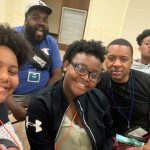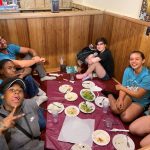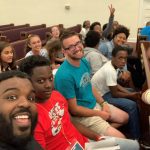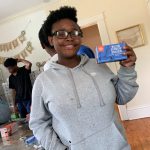A few weeks ago, we shared the launch of Theology Together 2.0. Today, Dwight (the director of Theology Together) will be sharing with us one experience where a Collide mission trip that used Theology Together’s curriculum had a profound effect the lived experiences of a set of students.
As the former youth director at Preston Taylor Ministries, one of the places of importance for us was to connect students to enriching trips and opportunities that exposed students to different contexts and experiences outside of their own. As a team, we hoped that this exposure would provoke students to not only think differently but inspire them to live differently. To live into this, we decided to undergo the process of looking for summer opportunities.
As a CYMT graduate resident and as a member of the Collide design team, we decided to participate in Collide 2018. Collide was a great fit for us because we were not interested in just volunteering. We wanted an opportunity that “collided” service with theological formation. We wanted enriching experiences that would challenge our students and I was confident Collide would do just that.
One of the objectives of Collide is to provide students with a “disorienting dilemma,” an experience that challenges how a person perceives and understands the world around them. Each day, youth groups attended various organizations to help build these dilemmas for students to then process, dialogue together, and answer questions.
Collide provided a lot of memorable experiences where I saw students being stretched and challenged both in faith and vocation. Specifically, I’m reminded of our student’s experiences at My Cup of Tea, a non-profit in the Orange Mound neighborhood of Memphis, TN, that helps countless women affected by poverty and neglect in the Memphis community over the years transform their lives by producing delicious and unique organic teas.
The students were so fascinated with the stories of the women who work there. One particular woman shared about her experiences with illness and that because of her illness she was unable to find work. As a result, she found herself on the street without any resources. She shared about being diagnosed with her illness and despite reaching out for help, she was unable to find it. Her pain was so unbearable that she couldn’t work which resulted in her homelessness. In her despair, she came across My Cup of Tea with a gift of sewing and using her hands to create. She spoke about the divine connection with My Cup of Tea and how it aligned with her gifts and her situation so well. I remember seeing my kids hang to every word and me thinking of how jealous I was because she had them captivated with every word she shared. I even remember in our debrief after how my kids were sharing nuggets from her testimony and as they shared I would think: “I’ve only said that 658 times this year. No big deal.” After she finished, my students bombarded her with hugs and questions. They were outside of their shells at this point and were full of thoughts and questions about her story and struggles.



We got back to the church after and my kids were bottomless in the number of questions they had between her personal story and the organization’s mission. Students began dreaming out loud about how they wanted to dedicate their lives to working at a place like My Cup of Tea. They were in the space between the dilemma and the transformation, the place we end up when we experience something disorienting and places us completely outside of our normal world view. We tend to not have difficulty finding these places but we do tend to find difficulty transitioning from the experience to a changed perspective, to a changed way of living.

Theology Together became vital for this space because it is designed to unglue students and leaders from the experiences, from the disorienting dilemmas, and helps put students and leaders into a more pragmatic space through dialogue and theological discussion. Through thought-provoking questions that examine our position and God’s position within the dilemma, students are challenged to come outside of their box of perspective and thought to a space of transformation, the place where the experience is no longer just “an experience” but is now a desired way of living.






